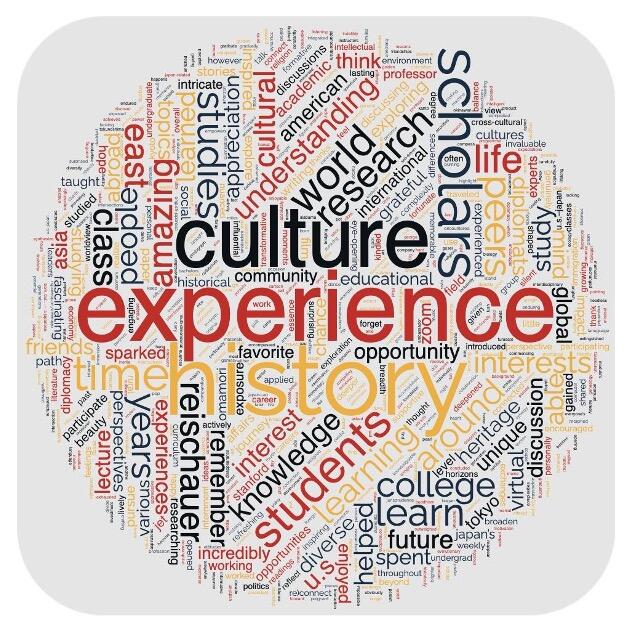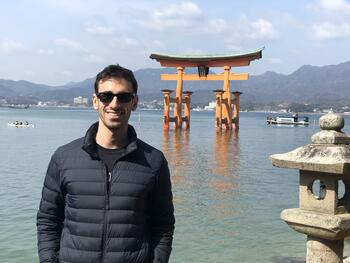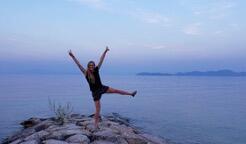20 Years of the Reischauer Scholars Program: Reflections and Legacies
20 Years of the Reischauer Scholars Program: Reflections and Legacies
Of the nearly 600 RSP alumni, many are engaged in Japan-related fields and U.S.–Japan relations.

Drawing from former U.S. Ambassador to Japan Edwin O. Reischauer’s legacy of developing a deep understanding of the Japanese people, culture, and society, the Reischauer Scholars Program—a unique online program that offers U.S. high school students an opportunity for the intensive study of Japan and U.S.–Japan relations—has fostered lasting connections with Japan for young students in the United States since its establishment in 2003. Welcoming the 20th RSP cohort at the beginning of 2023 was a milestone. Online teaching and learning was somewhat of a novelty back when the RSP was envisioned in the early 2000s, with many in the first few cohorts of Reischauer scholars needing to seek out computer access and Internet connections at their local libraries in order to participate in the weekly online classes.
As interest and funding in Japanese language waned following the bursting of the Japanese economic bubble in the early 1990s, a subsequent decline in the study of Japan at the higher education level was beginning to cause some concern within the Japan studies field. Former U.S. Ambassador to Japan Caroline Kennedy shared the following in videotaped remarks to the Reischauer scholars in 2013: “Appointed as ambassador to Japan by my father, President Kennedy, Ambassador Reischauer made tremendous contributions to America’s understanding of Japan… and he remains a model for me and all who follow in his path. As strong as our ties between the United States and Japan are, they are not self-sustaining. Our relationship is something each generation has to rediscover, recreate, and nurture.”
With these priorities in mind, SPICE sought to create a space for high school students to deeply engage in the study of Japan and U.S.–Japan relations, regardless of where in the United States they called home. Introducing students to leading scholars, experts, and diplomats who could share both American and Japanese perspectives on their studies of these two countries, Dr. David Janes, former Director of Foundation Grants at the U.S.-Japan Foundation, Dr. Gary Mukai, SPICE Director, and Ms. Waka Takahashi Brown, the inaugural instructor of RSP, set the stage for a truly unprecedented learning opportunity. I began teaching the RSP from year three.
Importantly, the RSP sought to not just offer content expertise on the history, religions, culture, society, politics, economics, and foreign policy of Japan and U.S.–Japan relations, but to create a community of learners who could discuss these topics on a deeper level that would allow for different perspectives to be shared and understood. The goal of the RSP was never to offer a solely academically-focused course on Japan and the U.S.–Japan relationship. The hope was always to foster the next generation of leaders who could come together from across the United States, bringing together their shared passion for Japan and for learning new global perspectives, and to support each other in their continued growth as individuals who hoped to make a difference in the world as they moved through their academic and professional careers.
As the academic year began to wind down in late June 2023, the magnitude of 20 years of the RSP began to settle in. Since the first RSP cohort in 2004, nearly 600 talented high school students from across the United States have gone on to lead rich and fulfilling lives which, in many cases, have continued to involve Japan. I reached out to some RSP alumni this past summer, curious about how the RSP experience has influenced the life choices of our Reischauer scholars over the years. Connecting with alumni—especially when the rare opportunities arise to do so in person, as we did over lunch at Stanford University in 2021—is always a privilege. It was both enlightening and inspiring to read reflections from 20 years of RSP alumni; the depth and scope of the RSP impact clearly varying depending on how much time had passed since they had signed off after our last virtual class together.
In the final pages of Dr. George Packard’s biography, Edwin O. Reischauer and the American Discovery of Japan, he shares that Reischauer had scribbled the following note in 1984: “Peace in this world depends on international understanding and understanding on knowledge and skills at communication. Thus, peace ultimately depends on education” (Packard 293). It is my hope that the work that students have done in this course to deepen their international understanding will have a lasting impact not only for themselves, but for the U.S.–Japan relationship and beyond. Here are a few reflections that were shared with us by RSP alumni that reflect the range of experiences—and legacies— of the RSP, in their own words.


RSP was my first opportunity to delve deep and learn more about Japanese culture and history through an academic lens. Growing up in borderline rural Florida, prior to RSP, my only exposure to Japan and Japanese culture was through Cartoon Network anime shows and video games. I would say my time at RSP sparked an interest to continue to learn about Japanese culture. In college, I ended up taking Japanese language courses, which led to studying abroad in Japan. I have had two careers, both in medicine and in art. In both careers and in my personal life, Japan and Japanese culture continue to be a big part of it all.
—Carmel Mercado, RSP Class of 2005

After participating in the RSP in 2009, I went on to complete my undergraduate degree in Japanese Studies, graduating in 2013. The RSP laid a solid foundation for my undergraduate studies. Out of undergrad, I went straight into the JET Program where I was an assistant language teacher at the elementary and junior high school level on the island of Tokunoshima, which was historically part of the Ryukyu Kingdom but is currently administratively part of Kagoshima Prefecture. At the time I participated in RSP, I had never been to Japan but was really wanting to (re)connect with my Japanese heritage as a Nikkei gosei (fifth generation) from Hawaii. Since undergrad, I have also been exploring my Okinawan/Uchinaanchu heritage, and reflecting on RSP today, I think I'm doing much of what I did as a participant in 2009 by researching my genealogy and trying to (re)connect with indigenous Okinawan spiritual practices by learning more about lunar obon practices and doing (y)eisaa. I am also still connected to my RSP cohort members through social media. Although we don't talk much, it's nice to see how everyone is doing and how far we've come since we participated in RSP together.
—Micah Mizukami, RSP Class of 2009

I took RSP 12 years ago and it changed my life! Growing up in rural Maine, RSP did the remote Zoom classroom experience way before it was cool...and it worked! The program exposed me to Japan's culture and history, giving me an international mindset that I've kept with me since. I remember being able to talk to high level diplomats like the former ambassador to Japan which was especially formative. Years later, my Stanford RSP experience encouraged me to pursue a PhD in Computer Science at Stanford, where my specialty became English-Japanese Machine Translation. Today, some of my best friends in the world are Japanese. I split my time between Seattle and Tokyo. I consider Japan a second home on the other side of the world, all thanks to my RSP experience which kindled the initial interest and inertia.
—Reid Pryzant, RSP Class of 2011

RSP gave me a window into the college classroom while I was a high school student. From my room in Alabama, I suddenly had access to scholars, former diplomats, and experts from all over the world who gave fascinating lectures on subjects far outside my school curriculum but close to my own interests. Most importantly, however, RSP enabled me to connect with an incredibly unique group of students from all over the country, a group which became a surprisingly close online community by the end of the course.
—Vincent Wesselmann, RSP Class of 2016

I loved the cultural and historical lessons RSP offered me as a young scholar. They shaped my academic interests and drove me to pursue literature and cultural studies with a focus on East Asia. I went on to study abroad at Doshisha University in Kyoto during my junior year of college. After my short stint in Asia, I decided to further broaden my horizons by spending some time in Europe. I traveled on to Amsterdam, where I received a MA in comparative literature. Yet, once again, I was drawn back to Japan. I am typing this response seated in an express train speeding through Tokyo! I will spend the next year teaching English to young children in the Kanto region. Needless to say, my interest in Japan hasn’t waned in the slightest since enrolling in RSP. I’m happy to be back!
—Madison MacKenzie, RSP Class of 2016
I applied to RSP with the motivation to learn more about my cultural background, but what I remember most vividly is the exhilarating experience of bouncing off ideas with my peers… it was during those thoughtful discussions that my knowledge of Japan (and my stance on certain issues) was enriched the most. Our intellectual exchanges reminded me that learning happens not only from the consumption of educational materials, but also from the synergy of diverse perspectives.
—Mika Isayama, RSP Class of 2016

I had an amazing experience participating in the Reischauer Scholars Program. It inspired me to participate in the Sejong Korea Scholars Program and to receive a Bachelors in East Asian Studies. Thanks to the interest in East Asia that it inspired, I have now studied abroad in Korea, traveled around Japan, and hope to participate in the JET Program. I still think about the Buddhist monk who visited our class and the stories he told us!
—Grace Rembert, RSP Class of 2018
The RSP completely broadened my horizons with regards to Japanese culture and U.S. - Japan relations. I think so often in the U.S. we are taught with a bias towards the U.S. angle and it was so refreshing to view history through the lens of Japan and the Japanese perspective. Moreover, the RSP attracts a broad range of students from everywhere around the U.S.; the melting pot that facilitates was such a pleasure to be a part of and engaging with students with a variety of perspectives and experiences relating to Japan made the RSP extremely dynamic and engaging for me. Many of the guest speakers were extremely memorable. RSP '21 students were extremely fortunate to hear from George Takei, and my particular favorite was the film discussion we had on "大人の見る絵本 生れてはみたけれど" (I was born, but...). That film, which was silent and black and white, was so incredibly fascinating and the discussion we had on it was extremely thought provoking. In a sense that's what made the RSP so compelling -- we engaged in so many aspects and elements of Japanese history that there was something to satisfy everyone's personal interests, as well as something that sparked new interests and curiosities in everyone. Almost three years removed from doing the RSP, I look back on my experience with great fondness and am grateful for the friends I made along the way, many of whom I still am in contact with today.
—Jack Turner, RSP Class of 2021
I applied for RSP because I wanted to learn about Japanese history and Japanese-US relations, but what I took from the program was so much more than that. Particularly through the diverse set of speakers we had the opportunity to hear from, I was constantly realizing that no history is static, and that the study of history can not be an isolated field, it is connected to every profession and every person. My most favorite lecture was that from Andrew Lee, the U.S. Consulate General in Sapporo at the time, as I felt he showed how a deep understanding of history is vital to diplomacy.
—Sara Baudler, RSP Class of 2022
For more information about SPICE's online courses for students, visit our Student Programs page. To stay informed of SPICE news, join our email list and follow us on Facebook, Twitter, and Instagram.



